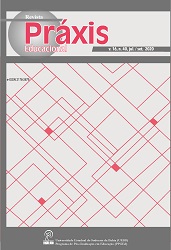REDISTRIBUTION, RECOGNITION AND REPRESENTATION: A NANCY FRASER READING WITH CHILDREN'S VIEW
DOI:
https://doi.org/10.22481/praxisedu.v16i40.6887Abstract
Social justice or distributive justice is a central theme of moral philosophy, as well as for the orientation of public policies involving the distribution of social resources. In the sociology of childhood field, this dimension has been studied mainly when it comes to the child's relation to social welfare, type and degree of his participation in the benefits provided by the State, and the nature and content of childhood policies as well. However, childhood is out of the current debate that discusses the meaning of social justice. Like other topics, the people leading the knowledge creation are adults who share with their peers a misconception of childhood as “not-being” and children as “who will be, but not yet". But it is not necessarily adequate the argument of those who reflect on justice, understanding it as how the different people who compound society could receive equal treatment, to find their link with the language of childhood sociology, when it requires acknowledgment of children's abilities or their right to hold social benefits themselves. This article will be based on the analysis of Nancy Fraser's proposals to show its applicability to the children's position concerning justice.
Downloads
References
ESPING-ANDERSEN, Gosta; GALLI, Duncan; HEMERIJH, Anton; MYLES, John. Por que precisamos de um novo estado de bem-estar social. Oxford/Nova Iorque: Oxford, 2002.
FERNANDEZ, Josefina. "Crianças: Cidadãos de hoje ou amanhã?" Revista Alternativa. Cadernos de Serviço Social. n. 16 de 2009. p. 111-126.
FRASER, Nancy. Redistribuição e reconhecimento: rumo a uma visão integrada de justiça do Gênero International Journal of Political Philosophy. 8, 1996. p. 18-40.
FRASER, Nancy. Justiça Interruptus. Reflexões críticas sobre a "Condição Pós-Socialista". Nova Iorque e Londres: Routledge. 1997.
FRASER, Nancy. Da redistribuição ao reconhecimento? Dilemas da justiça na era "pós-socialista". New Left Review, nº 0, 2000. p. 126-155.
FRASER, Nancy. Justiça social na era da política identitária: Redistribuição, reconhecimento e participação. In: FRASER, Nancy; HONNETH, Ariel. Redistribuição ou reconhecimento? Morata, 2006. p. 17-88.
FRASER, Nancy. Escalas da justiça. Barcelona: Pastor, 2008.
FRASER, Nancy. Política feminista na era do reconhecimento: uma abordagem bidimensional para a justiça de gênero. ARENAL, 19:2; Julho-Dezembro de 2012, p. 267-286
FRASER, Nancy. Da redistribuição ao reconhecimento? Dilemas da justiça na era "pós-socialista". Em J. Butler e N. Fraser Redistribuição ou Reconhecimento? Um debate entre marxismo e feminismo. Madrid: Traficantes de Sonhos. 2016. p.23-66.
FRASER, Nancy; HONNETH, Ariel. Redistribuição ou reconhecimento? Madrid: Morata. 2006.
GAITÁN MUÑOZ, Loudes. "A nova sociologia da infância. Contribuições de um olhar diferente" Política e Sociedade, 43-1, 2006. p. 9-26.
GAITÁN MUÑOZ, Loudes. De "menores" a protagonistas. Os direitos das crianças no trabalho social. Madrid: CGTS, 2014a.
GAITÁN MUÑOZ, Loudes. Cidadãos na escola, ou a participação das crianças no processo educacional. Uma visão sociológica. Revista Escenarios, 15, 2014b. p. 75-102.
GAITÁN MUÑOZ, Loudes . Os direitos humanos das crianças: cidadania além dos "3Ps", Sociedade e Crianças, 2, 2018. p. 17-37.
GAITÁN MUÑOZ, Loudes; LIEBEL, Manfred. Cidadania e direitos de participação das crianças. Síntese, 2011.
GIDDENS, Anthony. Sociologia. Madrid: Aliança Editorial, 2000.
GOUVEIA, Maria Cristina Soares; CARVALHO, Levindo Diniz; FREITAS, Fabio Accardo de; BIZZOTTO, Luciana Maciel. O protagonismo infantil no interior de movimentos sociais contemporâneos no Brasil, Sociedad e Infancias, 3, 2019. p. 43-63.
HART, Roger. A participação das crianças: da participação simbólica à participação autêntica. Florence: Innocenti, 1992.
O IAWGCP. Crianças como cidadãos ativos. Um guia de política e programa - Compromissos e obrigações para os direitos cívicos das crianças e o engajamento cívico no leste da Ásia e no Pacífico (en línea), 2008. http://resourcecentre.savethechildren.se/library/children-active-citizens-policy-and-programme-guide-commitments-and-obligations-childrens, accesoel 20 de febrero de 2019.
JAMES, Alison. "Agency" en Qvortrup, J., Corsaro, W. A. y Honig, M. (eds.) The Palgrave Handbook of Childhood Studie s. Londres: Palgrave Macmillan, 2011. p. 34-45.
JAMES, Alison; PROUT, Alan (Eds.). Construindo e Reconstruindo a Infância. Falmer Press, 1997.
JENKS, Chris (ed.). A Sociologia da Infância. Leituras Essenciais. Gregg Revivals, 1992.
LARKINS, Gato. "Enquadrando a cidadania das crianças: explorando o espaço de reivindicações infantis de justiça social usando a concepção de representação de Nancy Fraser, 2012.
LAWY, Robert; BIESTA; Gert. "Cidadania como Prática: As Implicações Educacionais de uma Compreensão Inclusiva e Relacional da Cidadania" British Journal of Educational Studies, 54 (1), 2006, p. 34-50.
LIEBEL, Manfred. "Os movimentos das crianças trabalhadoras. Uma Abordagem da Sociologia" Política e Sociedade, 43, (1), 2006. p. 105-123. http://www.ucm.es/BUCM/revistas/cps/11308001/articulos/POSO0606130105A.PDF, acesso 2 de dezembro de 2019.
LIEBEL, Manfred. "Cidadania de Baixo. Direitos das Crianças e Movimentos Sociais" en Invernizzi, A. y J. Williams (eds.). Crianças e Cidadania. Los Angeles, Londres, Nueva Delhi y Cingapura: SAGE Publications, 2008, p. 32-43.
MAYALL, Berry. Rumo a uma Sociologia para a Infância. Pensando na vida das crianças. Buckingham: Open University Press, 2002.
MAYALL, Berry. "Geração e gênero: estudos infantis e feminismo". En: MAYALL, B.;ZEIZER, H. (Eds.) Infância em Perspectiva Geracional.Londres: Instituto de Educação, 2003.
MOOSA-MITHA, M. "Uma Alternativa Centrada na Diferença para a Teorização dos Direitos de Cidadania das Crianças" Estudos de Cidadania, 9 (4), 2005. p. 369-388.
OAKLEY, Ann. "Mulheres e Crianças Primeiro em Última: Paralelos e Diferenças entre Estudos infantis e femininos". Relatório Eurosocial 47. Viena: Centro Europeo, 1993.
OLK, Thomas. Crianças, Relações Geracionais e Justiça Intergeracional. En J. Qvortrup et al. Infância Estudos. Basingstoke: Palgrave, 2011.
OLK, Thomas; WINTERSBERGER, Helmut. "Estados de Bem-Estar Social e Ordem Geracional". In:WINTERSBERGER;Helmut. et al. (eds).Infância, Ordem Geracional e o Estado de Bem-Estar Social: Explorando o Bem-Estar Social e Econômico das Crianças. Odense: University Press of Southern Yrnamarca, 2017.
PAVEZ SOTO, Iskra; KATTAN SERED, Natalia. Conceito de agência em estudos infantis. Uma revisão teórica, Sociedade e Crianças, 3, 2019. p. 193-210.
QVORTRUP, Jens. A infância como fenômeno social. Relatório Nacional Dinamarca. Viena: Centro Europeu, 1990.
QVORTRUP, Jens. A infância como fenômeno social. Uma introdução a uma série de relatórios nacionais. Relatório Eurosocial 36/1990. Viena, Centro Europeo, 1990.
QVORTRUP, Jens. "Nove teses sobre a Infância como fenômeno social". Relatório Eurosocial 47/1993. Viena, Centro Europeo, 1993. p. 11-18.
ROSEN, Rachel; TWANLEY, Katherine. (eds.). Feminismo e a Política de Amigos de Infância ou Inimigos? UCL Press: Londres, 2018.
VERHELLEN, Eugeen. Direitos de Crianças e Participação. En: HEILIÖ, P. L.; LAURONEN, E., BARDY, M. (eds.). Política de Infância e Crianças em Risco. Provisão - Proteção - Participação. Viena: Centro Europeu de Política e Pesquisa de Bem-Estar Social, 1993. p. 121-130.
VOLTARELLI, Monique Aparecida, GAITON MUOZ, Lourdes, LEYRA FATOU, Begoña: "A sociologia da infância e Bourdieu: diálogos no campo nos países de língua espanhola", Política e Sociedade, 55(1), 2018. p. 283-309.
WINTERSBERGER, Helmut. "Idade Eleitoral, dezesseis anos. A Reforma Eleitoral Austríaca de 2007". Revista de Estudos da Juventude. Nº 85 (edição online) Documento 2, 2009. p. 1-22. http://www.injuve.es/contenidos.downloadatt.action?id=2018997836
WYNESS, Michael. "Participação infantil: definições, narrativas e disputas" en Claudio Baraldi y Tom Cockburn (eds.) Theorising Childhood: Citizenship, Rights and Participation. Londres: Palgrave Macmillan, 2018. p. 53-72.
Downloads
Published
How to Cite
Issue
Section
License
Você é livre para:
Compartilhar - copia e redistribui o material em qualquer meio ou formato; Adapte - remixe, transforme e construa a partir do material para qualquer propósito, mesmo comercialmente. Esta licença é aceitável para Obras Culturais Livres. O licenciante não pode revogar essas liberdades, desde que você siga os termos da licença.
Sob os seguintes termos:
Atribuição - você deve dar o crédito apropriado, fornecer um link para a licença e indicar se alguma alteração foi feita. Você pode fazer isso de qualquer maneira razoável, mas não de uma forma que sugira que você ou seu uso seja aprovado pelo licenciante.
Não há restrições adicionais - Você não pode aplicar termos legais ou medidas tecnológicas que restrinjam legalmente outros para fazer qualquer uso permitido pela licença.












